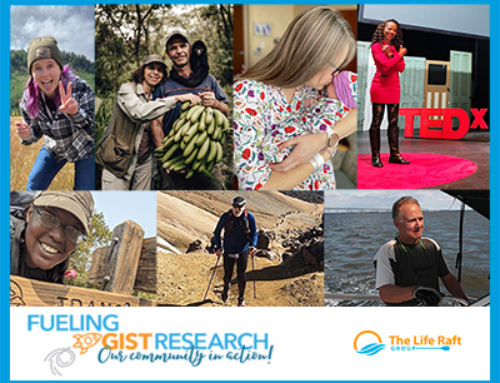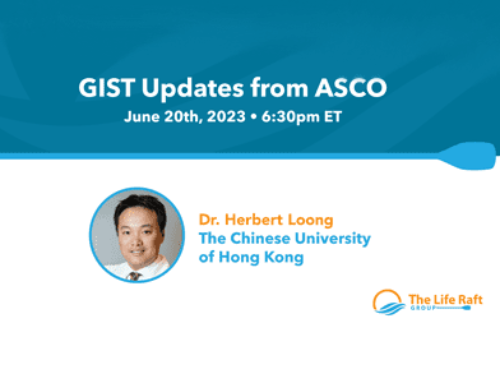The Life Raft Group is excited to cast a new lifeline to increase the quality of life and survival rates of Pediatric and SDH-Deficient GIST patients worldwide through the establishment of a collaborative research consortium.
After making significant strides in increasing survival and quality of life for patients with Gastrointestinal Stromal Tumors (GIST), a rare cancer, the LRG is now focused on patients with a rare subset of this cancer, which disproportionally targets children and young adults.

Norman Scherzer, LRG Executive Director
According to LRG Executive Director, Norman J. Scherzer, “We have more than doubled progress for patients living with GIST, with a major exception – Pediatric and SDH-Deficient GIST,” Scherzer said. “There are no effective treatments for these patients. That is our unfinished business: Nobody wants to lose any more children.”
“What if we could bring together virtually all the leading experts in the world to sit in one room, in one place and agree to work together to save these children?” Scherzer said of the Pediatric & SDH-Deficient GIST Consortium’s goal to incubate progress within this targeted population. “Well, we did.”
Biden Cancer Summit
The innovative collaborative Pediatric & SDH-Deficient GIST Consortium, unveiled today at the Biden Cancer Summit, supports patients and caregivers at a critical time to share data, tissue, and resources to address the urgency of cancer treatment.
Vice President Joe Biden said: “We are at an inflection point in the understanding and treatment of cancer and are starting to break down barriers and change the culture in ways that are needed to deliver what patients deserve – a cancer research and care system that puts saving lives above all else. The commitments we have received, including the Pediatric & SDH-Deficient GIST Consortium presented by the Life Raft Group, bring us closer to developing the right systems, the right culture to get us there.”
The Consortium aims to identify at least one effective treatment within three years as demonstrated by the initiation of clinical trials for the SDH-Deficient GIST population.
Why a Pediatric & SDH-Deficient Consortium?
Historically, most researchers with an interest in Pediatric and SDH-Deficient GIST worked independently, with each seeing very few of these rare disease patients. The NIH Pediatric and Wildtype GIST Clinic was established in 2008 with the support of patient advocacy organizations, to bring together clinicians and patients to begin to better understand this rare disease. After ten successful years, this program is at a crossroads, at a time when no standard of care has been defined.
“The NIH Clinic permitted a critical mass of these types of patients to be seen in one place and gave us a data set that we never could have had if it didn’t take place.” Scherzer said. “The Clinic accomplished its first purpose: bringing these kids together to gather enough information. The Consortium is what comes next. How do we move from this background information to finding the types of targets that we have found with other types of GIST?”
Because of the critical need for research, the Life Raft Group created and convened the inaugural Pediatric & SDH-Deficient GIST Research Symposium on July 14-15, 2018. The goal of the Symposium was to gather key clinicians/researchers to identify KIT-independent therapies for targeting SDH-Deficient tumors in order to improve patient outcomes. Because Pediatric and SDH-Deficient GIST is a rare, small sub-specialty, the number of clinicians and researchers in attendance was specific and targeted. However, it is this small group of accomplished researchers who can make significant advances in the field by sharing their research progress with one another and agreeing to work together to strengthen and advance research on Pediatric and SDH-Deficient GIST.
An outgrowth of the Symposium was the formation of the Pediatric & SDH-Deficient GIST Consortium. The aim of this collaborative patient-centered consortium is to extend and sustain the work of the NIH Clinic and other research efforts, with the initial goal of finding successful targeted therapies to keep these patients alive, and to improve their quality of life. The ultimate goal is to find a cure through global collaboration.
Founders of The Pediatric & SDH-Deficient GIST Consortium Include Clinical/Research Partners:
- Christopher B. Weldon, MD, PhD, Boston Children’s Hospital
- Venkata Ramesh Bulusu, MD, Cambridge University Hospitals, UK
- Ruth Casey, PhD, Cambridge University Hospitals, UK
- Olivier Giger, MD, Cambridge University Hospital, UK
- Lee Helman, MD, Children’s Hospital Los Angeles
- Suzanne George, MD, Dana-Farber Cancer Institute
- Katherine Janeway, MD, Dana-Farber Cancer Institute
- Jonathan Keith Killian, MD, PhD, Foundation Medicine
- Margaret von Mehren, MD, Fox Chase Cancer Center
- Joshua Schiffman, MD, Huntsman Cancer Institute
- Michael P. LaQuaglia, MD, Memorial Sloan Kettering Cancer Center
- Jason Sicklick, MD, Moores Cancer Center, University of California, San Diego
- Fernanda Arnaldez, MD, National Cancer Institute
- Markku Martti Miettinen, MD, National Cancer Institute
- Karel Pacak, D.Sc., MD, PhD, National Institutes of Health
- Constantine Stratakis, MD, National Institutes of Health
- Michael Heinrich, MD, Oregon Health and Science University
- Alberto S. Pappo, MD, St. Jude Children’s Research Hospital
- Jonathan Trent, MD, Sylvester Comprehensive Cancer Center
- Eyal Gottlieb, MSc, PhD, Technion-Israel Institute of Technology
- Maria Pantaleo, MD, University of Bologna, Italy
- Sosipatros Boikos, MD, VCU Massey Cancer Center
Patient Advocacy Partners Include:
- Phyllis Gay, GIST Support International
- Dr. Victoria Bassett, GIST Support UK
- Jayne Bressington, GIST Support UK
- Becky Owens, SDH-RA Cancer Research Advocates
- Norman Scherzer, The Life Raft Group
- Sara Rothschild, MPH, The Life Raft Group
- Yu Wang, MB, PhD, The Life Raft Group
About the Biden Cancer Summit
On September 21, Vice President Joe Biden and Dr. Jill Biden are hosting the national Biden Cancer Summit in Washington, D.C. to drive the urgency of now by promoting new solutions, bringing together problem solvers, and telling stories that epitomize what it means to be cancer FIERCE.
The Summit in D.C. is the flagship event of more than 350 Biden Cancer Community Summits convening throughout the day, all focused on improving the cancer journey for patients, their families, and caregivers.
About the Biden Cancer Initiative
The Biden Cancer Initiative is an independent nonprofit organization committed to developing and driving the implementation of solutions to accelerate progress in cancer prevention, detection, diagnosis, research, and care, and to reduce disparities in cancer outcomes.



